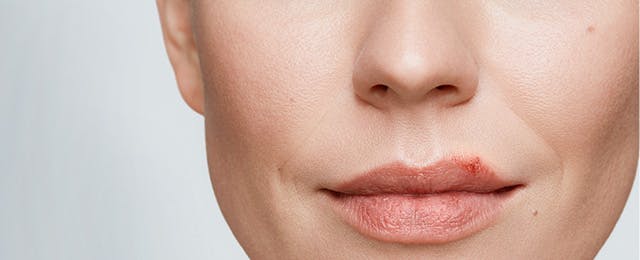WHAT’S TRIGGERING YOUR COLD SORES?
What Causes Cold Sores?
When we wonder, “What causes cold sores on and around the lips?” we should also be thinking in terms of what triggers cold sores. The herpes simplex virus (HSV-1) is what causes cold sores, but there are various psychological and environmental factors, such as stress or a cold, that can trigger an outbreak.
Triggers of cold sore outbreaks vary from person to person. What causes cold sores to appear for one person may not be the same for another. It's important to figure out your likeliest cold sore triggers so you can avoid them, or at least manage symptoms more quickly and effectively when they occur.
Cold Sore Triggers
The main causes of cold sores are:
- stress
- fatigue
- exposure to sun and wind
- hormonal changes
- weakened immune system
Your cold sore triggers are:

Stress
Research has shown that feeling under pressure or being stressed can affect you physically. If you’re wondering if stress causes cold sores, the answer appears to be yes. When we’re under mental stress, our immune systems suffer. This gives your dormant cold sore virus a chance to replicate and cause havoc in the form of unsightly blisters.
Try these relaxation techniques:
- breathwork
- mental body scan
- yoga
- meditation
- exercise
- get outside or spend time in nature

Fatigue
Fatigue is another possible answer when it comes to the question, “What causes a cold sore outbreak?” Feeling tired and run down can make you vulnerable to cold sores. Lower energy stores tax your immune system, making it harder for your body to deal with viruses, including the cold sore virus. Getting enough good quality rest is key to helping your body fight off the virus and prevent it from producing symptoms in the form of blisters on or around the lips.
There are plenty of things that can interfere with getting a good night’s rest, from stress to having too much caffeine. Here are some ways to help you get the quality sleep you need:
- Make your bedroom dark, quiet and comfortable.
- Avoid blue light from screens (TV/laptop/phone) after 8pm.
- Stick to a bedtime routine.
- Nap for short periods of 10-30 minutes before 3pm only.
- Exercise earlier in the day.

Cold weather
Cold weather can trigger cold sores. Changes in temperature can play havoc with your body’s ability to keep the virus from producing blisters. The colder temperatures of winter, as well as wind, can cause your lips to dry out and chap, making them more vulnerable to an outbreak of cold sores.

Excessive sunlight
Sun exposure, along with the common cold and fatigue, has been identified in clinical studies as one of the three most common causes of cold sores. There are some easy ways to protect yourself:
- Wear a lip sunscreen.
- Use a wide-brim hat.
- Stay in the shade.

Hormonal changes
Hormonal changes, such as those related to menstruation, can trigger cold sores, too.2

Dental treatment
Visiting a dentist may trigger an outbreak of cold sores. Pressure on the lips or mouth area during dental treatment can result in a cold sore blister, as can the stress and anxiety some people experience during dentist visits.
Minimize the chances of an outbreak with the following tips:
- Talk to your dentist about cold sores.
- Call your dentist in advance if you have a cold sore.
- Apply a cool compress to your lip after your visit.

Weakened immune system
The cold sore virus remains inactive in nerve cells of the face. But while your immune system usually ensures that the virus doesn’t replicate and cause blisters, if it’s busy fighting off another virus or infection, such as a cold or the flu, you may experience a cold sore outbreak.
Here are some steps to help avoid an outbreak during cold and flu season:
- Be prepared before flu season begins (winter).
- Get a flu vaccination.
- Be germ-conscious – wash your hands more often.
- Stop smoking.
- Eat foods that are rich in vitamins A, C and E to prevent deficiencies.
- Give your body adequate rest.
Treating Cold Sores
Knowing more about the triggers of cold sore outbreaks is your first step towards avoiding them, and it can also help you to be prepared to catch that tingling before it turns into a full-blown blister. Use Abreva cream as soon as you feel that telltale tingling or burning sensation and shorten your healing time.
SOURCES (LISTED ON US PAGE):
- What causes cold sores? WebMD. https://www.webmd.com/skin-problems-and-treatments/ understanding-cold-sores-basics#2. Accessed 11/06/2019.
- Cold sores. Mayo Clinic. https://www.mayoclinic.org/diseases-conditions/cold-sore/symptoms-causes/syc-20371017. Accessed 11/06/2019.
- Sunlight is an important causative factor of recurrent herpes simplex. Cutis. https://www.ncbi.nlm.nih.gov/pubmed/15603217. Accessed 06/25/19.
- How Abreva cream works. Abreva. https://www.abreva.com/cold-sore-products/how-abreva-cream-works/. Accessed 11/06/2019.
ADDITIONAL SOURCES (REQUESTED BY MEDICAL/REG TEAM):
- Can cold weather trigger cold sores? Patient.info. https://patient.info/news-and-features/can-cold-weather-trigger-cold-sores. Accessed October 8, 2021. Referenced text is highlighted in source PDF.
- Cold sore. Mayo Clinic. https://www.mayoclinic.org/diseases-conditions/cold-sore/symptoms-causes/syc-20371017. Accessed October 8, 2021. Referenced text is highlighted in source PDF.





